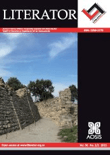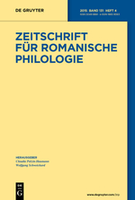
Lingua Montenegrina
metrics 2024
Exploring the Depths of Montenegrin Language and Literature
Introduction
Lingua Montenegrina is a distinguished academic journal dedicated to exploring and advancing the fields of Montenegrin language and literature. Published by the Institute of Montenegrin Language and Literature, this journal serves as a vital platform for researchers, educators, and students interested in the nuances and development of Montenegrin linguistics, literature, and cultural studies. With an ISSN of 1800-7007, it contributes significantly to the scholarly discourse in the region and beyond. While the journal operates under a traditional subscription model, it ensures that its readership has access to high-quality research that is pivotal for understanding Montenegrin identity and cultural expressions. The commitment of Lingua Montenegrina to rigorous academic standards and its focus on regional studies positions it as an essential resource for those looking to deepen their understanding of the Montenegrin language and its literary heritage.
Metrics 2024
 -
- -
- -
- -
-Metrics History
Rank 2024
JCI (Web Of Science)
Quartile History
Similar Journals

Literator-Journal of Literary Criticism Comparative Linguistics and Literary Studies
Illuminating Literary Discourse Through Comparative AnalysisLiterator - Journal of Literary Criticism, Comparative Linguistics and Literary Studies, published by AOSIS, is a prestigious open-access journal that has been serving the academic community since 1980. With an ISSN of 0258-2279 and an E-ISSN of 2219-8237, this journal provides a vital platform for the dissemination of innovative research in the fields of linguistics and literary studies. The journal proudly maintains an impactful presence within the academia, marked by its 2023 categorization in Q2 for Linguistics and Language and Q1 for Literature and Literary Theory. With impressive Scopus rankings—132nd in Literature and Literary Theory and 448th in Language and Linguistics—it represents the intersection of critical engagement and scholarly inquiry. Literator's commitment to open access fosters inclusivity and broadens the reach of scholarly work, making high-quality research accessible to all. The journal’s scope encompasses critical analyses, comparative studies, and linguistics, inviting contributions that shape and challenge current paradigms. As it converges from 2014 to 2024, Literator continues to illuminate the rich tapestry of literary discourse and linguistic understanding, appealing to researchers, professionals, and students eager to expand their knowledge in these dynamic fields.

ZEITSCHRIFT FUR ROMANISCHE PHILOLOGIE
Cultivating Knowledge in the Humanities Through Rigorous ResearchZEITSCHRIFT FUR ROMANISCHE PHILOLOGIE, published by Walter de Gruyter GmbH, stands as a prominent peer-reviewed journal dedicated to the fields of Linguistics, Literature, and Literary Theory. Established in 1877 and continuing its legacy to the present day, this esteemed journal offers a platform for comprehensive scholarship that explores the intricacies of Romance languages and their literary heritage. With a notable Q1 ranking in Literature and Literary Theory and a Q2 ranking in Linguistics and Language, it has secured its place among leading resources in the humanities. Researchers, educators, and students benefit from its rich historical context and current contributions to the understanding of Romance languages and literature. Though currently not available as Open Access, the journal prioritizes the dissemination of high-quality research, making significant strides in fostering academic dialogue and advancement. Its address at Genthiner Straße 13, Berlin, Germany, situates it in a hub of scholarly activity, bridging the past with contemporary literary discourse.

Heritage Language Journal
Preserving Voices, Celebrating CulturesThe Heritage Language Journal is an esteemed publication dedicated to the field of heritage language studies, providing a platform for advanced research and discussions surrounding bilingualism, language maintenance, and cultural identity. Published by BRILL, a recognized leader in academic publishing, this journal aims to bridge the gap between theory and practice, offering insightful articles, empirical studies, and critical reviews that advance understanding of how heritage languages influence personal and community identity. With an ISSN of 1550-7076, the journal serves as an essential resource for researchers, professionals, and students engaged in linguistics, sociolinguistics, and multicultural studies. Although currently not an open-access journal, it maintains rigorous academic standards and is committed to fostering an inclusive dialogue on heritage languages worldwide. Additionally, by contributing to the ongoing discourse in this vital area of study, the Heritage Language Journal plays a significant role in preserving linguistic diversity and cultural heritage.

Sibirskii Filologicheskii Zhurnal
Bridging Cultures Through Language and LiteratureSibirskii Filologicheskii Zhurnal is a prestigious academic journal published by the Russian Academy of Sciences, Institute of Cytology and Genetics. With ISSN 1813-7083, it is dedicated to advancing research in the fields of Cultural Studies, Linguistics and Language, and Literature and Literary Theory, and has achieved notable rankings, including Q2 in Cultural Studies and Linguistics, and Q1 in Literature for 2023. The journal provides a platform for scholarly discourse, contributing valuable insights to its fields with an evolving scope that spans from 2018 to 2024. Though not an open-access journal, Sibirskii Filologicheskii Zhurnal serves as a vital resource for researchers, professionals, and students in the Russian Federation and beyond, fostering a deeper understanding of linguistic and literary phenomena. Its commitment to high-quality content makes it an essential addition to any academic's library.

Caplletra
Connecting Scholars Through Linguistic InnovationCaplletra is a distinguished open-access journal dedicated to the field of linguistics and language studies, published by PUBL ABADIA MONTSERRAT since its inception. Based in Barcelona, Spain, this journal has been a vital resource for researchers, professionals, and students engaged in the intricate explorations of language and its applications since its transition to open access in 2005. Despite its current quartile ranking of Q4 within the Linguistics and Language category as of 2023, Caplletra continues to serve as an inclusive platform, fostering a dialogue that encourages a diverse range of scholarly contributions. Covering an expansive scope in the converged years from 2018 to 2024, it plays a crucial role in disseminating innovative research and insights. With its ISSN 0214-8188 and E-ISSN 2386-7159, Caplletra is committed to making academic work accessible to all, enhancing the landscape of linguistic scholarship and reflecting the evolving nature of language studies.

Revista da Anpoll
Connecting scholars through open access to cutting-edge studies.Revista da Anpoll is a prestigious academic journal dedicated to the fields of Letters and Linguistics, published by the ASSOC NAC POS-GRADUACAO PESQUISA LETRAS & LINGUISTICA in Brasilia, Brazil. Since its inception in 1994, this Open Access journal has aimed to foster scholarly communication and lead discourse in the linguistic and literary disciplines, allowing researchers and practitioners free access to cutting-edge research and findings. Although it does not currently have an H-index, the journal continues to attract high-quality submissions from experts in its field, contributing to the global academic community. By offering a platform for innovative studies and discussions, Revista da Anpoll plays a critical role in advancing knowledge and practice within linguistics and literary studies, making it an invaluable resource for academics, professionals, and students alike.

ZEITSCHRIFT FUR DEUTSCHE PHILOLOGIE
Fostering Academic Exchange in the HumanitiesZEITSCHRIFT FUR DEUTSCHE PHILOLOGIE is a prestigious academic journal dedicated to the exploration of German philology, literature, and linguistic theory, published by Erich Schmidt Verlag. With a commitment to advancing scholarship in the field, it showcases a diverse range of research articles, critical essays, and theoretical explorations that contribute to the understanding of German language and its literary heritage. While the journal has experienced fluctuating coverage in indexing databases such as Scopus, it remains a valuable resource for researchers and students alike, offering insights into relevant academic discourse. Despite not being openly accessible, the journal continues to serve as an important platform for academic exchange and innovation, allowing scholars to engage with the complexities of language and literature. Its rigorous peer-review process ensures that only high-quality research is published, making it essential reading for anyone invested in the humanities.

Acta Baltico-Slavica
Illuminating Slavic Cultures Through Open Access ResearchActa Baltico-Slavica, an esteemed academic journal published by the Polish Academy of Sciences, Institute of Slavic Studies, serves as a vital platform for the exploration of Slavic cultures, languages, and historical narratives. Since its transition to Open Access in 2014, the journal has fostered inclusivity and accessibility, allowing researchers, professionals, and students to engage with cutting-edge scholarship in the fields of History, Linguistics and Language, and Literature and Literary Theory. With a commendable impact as indicated by its category quartile rankings (Q2 in History and Literature, Q3 in Linguistics), and Scopus rankings reflecting its significance within the academic community, Acta Baltico-Slavica not only contributes to the rich tapestry of scholarship surrounding the Baltic and Slavic regions but also encourages interdisciplinary dialogue. The journal’s commitment to advancing knowledge across its fields of study makes it a prominent destination for scholarly discourse and research inquiry.

Mundo Eslavo-Journal of Slavic Studies
Bridging Literature, History, and LinguisticsMundo Eslavo - Journal of Slavic Studies is a prominent journal published by UNIV GRANADA, EDITORIAL, dedicated to advancing the field of Slavic studies through open access scholarship since 2004. With an ISSN of 1579-8372 and an E-ISSN of 2255-517X, the journal aims to provide a platform for interdisciplinary research, covering a wide array of topics including literature, culture, history, and linguistics of Slavic regions. Based in Granada, Spain, this journal is crucial for researchers, professionals, and students seeking to explore and contribute to the understanding of Slavic heritage and contemporary issues. With a commitment to accessibility and scholarly rigor, Mundo Eslavo invites submissions that push the boundaries of conventional discourse in Slavic studies, ensuring that critical insights and diverse perspectives reach a global audience.

Slavia Meridionalis
Fostering global dialogue through open-access research.Slavia Meridionalis is a distinguished open-access journal published by the Polish Academy of Sciences, Institute of Slavic Studies, dedicated to advancing scholarly discourse in the fields of Anthropology, Cultural Studies, History, Linguistics and Language, and Literature and Literary Theory. With its ISSN 1233-6173 and E-ISSN 2392-2400, this journal has made significant strides in promoting research since its inception in 2014. Operating from Warsaw, Poland, Slavia Meridionalis aims to serve as a pivotal platform for researchers and students alike, fostering interdisciplinary collaboration and knowledge dissemination. The journal holds respectable rankings in its various categories, some achieving Q3 status, which reflects its commitment to quality scholarship within the academic community. By providing open access to its readership, Slavia Meridionalis ensures that pivotal research is readily available for the global audience, thus enhancing its relevance and impact across diverse fields.